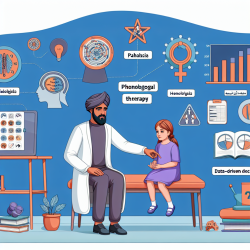Unlocking the Secrets of Phonological Therapy for Jargon Aphasia
As speech-language pathologists, our ultimate goal is to improve communication outcomes for our clients, especially children. In this blog, we delve into the findings of the research article "Deciphering the mechanisms of phonological therapy in jargon aphasia" by Arpita Bose et al., and explore how these insights can enhance your practice.
Understanding Jargon Aphasia
Jargon aphasia is a complex language disorder characterized by fluent but often unintelligible speech, filled with nonwords. It poses significant challenges for both diagnosis and treatment. The study by Bose et al. focuses on phonological therapy, specifically Phonological Component Analysis (PCA), to address naming difficulties in individuals with jargon aphasia.
Key Findings from the Study
The study involved a detailed examination of a participant, AM, with severe neologistic jargon aphasia. The researchers identified a deficit in the connection between semantics and phonology, which hindered AM's ability to access phonological word forms. Through PCA therapy, AM showed improvement in naming responses during the re-learning phase, although these gains were not maintained long-term, nor did they generalize to untreated items.
Implications for Practitioners
Here are some actionable insights for practitioners based on the study's findings:
- Targeted Phonological Therapy: Phonological therapy can be effective in improving naming abilities during the re-learning phase. Consider integrating PCA into your therapeutic approaches for clients with similar profiles.
- Assessing Candidacy: Before implementing phonological therapy, assess the client's oral reading and repetition abilities. These skills are crucial for the successful application of phonological cues.
- Active Engagement: Encourage clients to actively engage with therapy cues. This active participation is essential for deeper processing and potentially longer-lasting effects.
- Monitoring and Maintenance: Regular monitoring and follow-up sessions are necessary to sustain therapy gains. Consider developing strategies to enhance the maintenance and generalization of learned skills.
Encouraging Further Research
The study highlights the need for further research to explore the linkage between underlying deficits and therapy outcomes. As practitioners, staying informed about the latest research and contributing to the field through your observations and findings can lead to better therapeutic approaches and outcomes.
To read the original research paper, please follow this link: Deciphering the mechanisms of phonological therapy in jargon aphasia.










